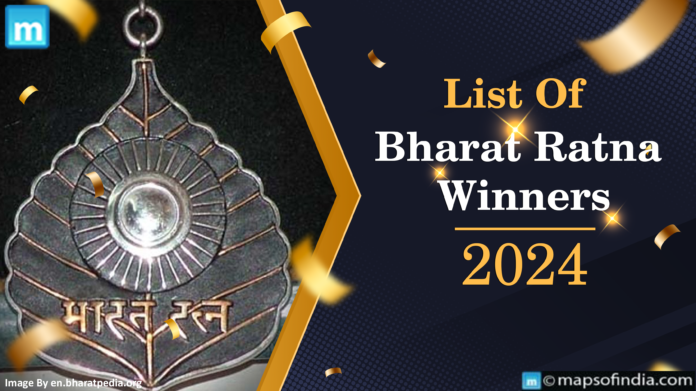The highest civilian honour in India, the Bharat Ratna Award, was established in 1954. It is granted to people who have demonstrated outstanding public service and excelled in any field of human endeavour, including literature, science, and the arts. The Bharat Ratna award is open to all individuals, regardless of gender or status. In any given year, no more than three people may receive the award. The Indian President bestows the award. There have been 16 posthumous recipients of the Bharat Ratna award so far.
Five distinguished individuals who have made outstanding contributions to politics, governance, and agriculture will receive it in 2024. PV Narasimha Rao, LK Advani, Karpoori Thakur, Chaudhary Charan Singh, and MS Swaminathan are the names on the list.
What are the Notable Contributions of Bharat Ratna Awardees (2024)?
Karpoori Thakur
-
- Karpoori Thakur, popularly known as “Jan Nayak,” was the eleventh Chief Minister of Bihar and served twice in that capacity: 1970–71 and 1977–79. He will receive the Bharat Ratna posthumously.
- Karpoori Thakur was the first to implement the Mungeri Lal Commission’s recommendations and give the Other Backward Classes (OBCs) the benefit of reservation while serving as chief minister of Bihar from 1977 to 1979.
- In 1978, he introduced a novel system of reservations, allocating 26% of reservations with specific quotas for women, economically disadvantaged classes among upper castes, Other Backward Classes (OBCs), and economically disadvantaged classes (EBCs).
- Thakur fought for marginalised groups’ rights and strongly emphasised social justice and inclusive development.
Mankombu Sambasivan (MS) Swaminathan
-
- MS Swaminathan, the “Father of India’s Green Revolution”, helped India modernise and achieve agricultural self-sufficiency. He will be given the Bharat Ratna posthumously.
- worked with Norman Borlaug to create high-yielding rice and wheat hybrids that revolutionised Indian agriculture in the 1960s and 1970s.
- As head of the National Commission of Farmers, he championed fair prices for agricultural goods and ecologically responsible farming practices.
- His input was essential in formulating the Farmers’ Rights and Protection of Plant Varieties Act of 2001.
- Swaminathan was bestowed with the Albert Einstein World Science Award in 1986, the Ramon Magsaysay Award in 1971, and the Shanti Swarup Bhatnagar Award in 1961.
- He was given the Padma Shri (1967), Padma Bhushan (1972), and Padma Vibhushan (1989) awards for recognition.
Pamulaparthi Venkata (P. V.) Narasimha Rao
-
- After serving as India’s ninth prime minister from 1991 to 1996, P. V. Narasimha Rao will receive the Bharat Ratna posthumously.
- When he was prime minister, P.V. Narasimha Rao changed India’s foreign policy by forging new connections with Israel and strengthening relationships with the US.
- For standing for India’s right to pursue its nuclear policy, he preserved the country’s independence.
- After the LPG reforms of 1991 opened the economy to globalisation, lowered trade barriers, and started privatisation in several industries, Rao’s administration left behind a more confident polity and put India on a road of economic liberalisation and revival.
- He released SahasraPhan, a Hindi adaptation of the well-known Telugu novel Veyi Padagalu.
Lal Krishna Advani
-
- Over the years, Advani has held the positions of President of the Bharatiya Janata Party for the longest period from the party’s founding in 1980 and Seventh Deputy Prime Minister of India (1999–2004).
Charan Singh
-
- Choudhary Leader and liberation fighter Charan Singh was from India. Formerly the chief minister of Uttar Pradesh, he was India’s fifth prime minister.
- He led Uttar Pradesh in the 1952 zamindari system abolition as minister of agriculture.
- He presented a number of policies to enhance the welfare and living conditions of the peasants and fought for their rights. Along with these beliefs, he supported social justice, democracy, and secularism.
- In his nonviolent fight for independence from the British Government, Charan Singh trailed in Mahatma Gandhi’s footsteps and faced multiple imprisonments.




